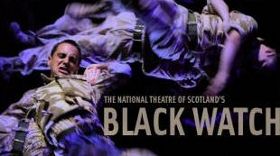KILLER’S REMORSE
It’s a bit haunting that Black Watch is performed in a National Guard armory where soldiers, like the Scottish laddies depicted in Gregory Burke’s combat pageant, trained before being sent to the trenches of World War I. This internationally acclaimed touring production from the National Theatre of Scotland could hardly find a more fitting venue in which to celebrate and question the warrior ethic.
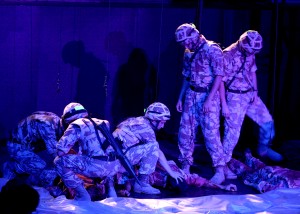 This soldier’s saga is based on the sometimes tense and, well, embattled interviews that Burke conducted with members of the legendary Black Watch regiment, veterans who had served in Helmand, Fallujah, Basrah and the “Black Triangle.” The intermissionless, 110-minute drama is a troubled tribute to these 800 fighters who were brought in to replace 4,000 Americans in the dangerous area. As Paul Higgins interviews them in a Glasgow pool hall, John Tiffany’s testosterone-fueled staging enacts the stages of their deployment and their deaths.
This soldier’s saga is based on the sometimes tense and, well, embattled interviews that Burke conducted with members of the legendary Black Watch regiment, veterans who had served in Helmand, Fallujah, Basrah and the “Black Triangle.” The intermissionless, 110-minute drama is a troubled tribute to these 800 fighters who were brought in to replace 4,000 Americans in the dangerous area. As Paul Higgins interviews them in a Glasgow pool hall, John Tiffany’s testosterone-fueled staging enacts the stages of their deployment and their deaths.
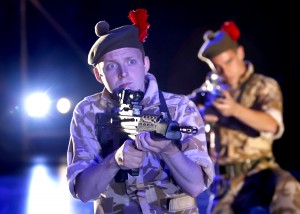 It’s hard to imagine a tighter ensemble–this side of the military itself–than these 10 mostly young Scottish actor-athletes. It helps that they’re the same age as Burke’s soldier boys, and have an acting ardor to rival battlefield bravado. What follows recalls The Hurt Locker in its attempt to simply tell it as it was. But inevitably the play condemns the morally questionable invasion of Iraq, a gambit that was far more political than military: the “worst diplomatic blunder in western history.” By the end the only reason they’re fighting here is that Tony Blair idiotically put them in harm’s way.
It’s hard to imagine a tighter ensemble–this side of the military itself–than these 10 mostly young Scottish actor-athletes. It helps that they’re the same age as Burke’s soldier boys, and have an acting ardor to rival battlefield bravado. What follows recalls The Hurt Locker in its attempt to simply tell it as it was. But inevitably the play condemns the morally questionable invasion of Iraq, a gambit that was far more political than military: the “worst diplomatic blunder in western history.” By the end the only reason they’re fighting here is that Tony Blair idiotically put them in harm’s way.
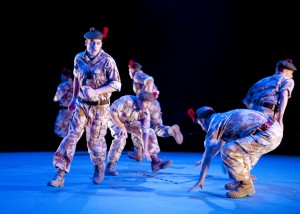 There’s little here that isn’t familiar to anyone who’s seen the numerous films and documentaries or the (comparatively fewer) docudramas inspired by this longest American combat. In gabby gatherings around a pool table (that later doubles as a transport vehicle) we see the soldiers’ mixed but mostly economic motives for enlisting (very little of which has anything to do with protecting their homeland). The hope of coming home a hero weighs more than the fear of not returning. Then, as a surrogate soldier shows as he’s quickly dressed in the changing uniforms of the Black Guard, a teenager needs something like a glorious gang to overcome adolescent self-doubt. A bagpipe blaring in the background during a parade “tattoo” doesn’t hurt either. But none expected to encounter suicide bombers as the enemy; nothing like that happened at Culloden, the Crimea, the Boer land, Mons or Tobruk. Newly arrived at the site of ancient Babylon, they expected to be like Robert the Bruce or Lawrence of Arabia, not a grunt dodging RPGs in a climate so hot that “sweating without moving” becomes a way of life. They’re stuck in the sand with no exit strategy, surrounded by suicide bombers, and no trace of glory to be found.
There’s little here that isn’t familiar to anyone who’s seen the numerous films and documentaries or the (comparatively fewer) docudramas inspired by this longest American combat. In gabby gatherings around a pool table (that later doubles as a transport vehicle) we see the soldiers’ mixed but mostly economic motives for enlisting (very little of which has anything to do with protecting their homeland). The hope of coming home a hero weighs more than the fear of not returning. Then, as a surrogate soldier shows as he’s quickly dressed in the changing uniforms of the Black Guard, a teenager needs something like a glorious gang to overcome adolescent self-doubt. A bagpipe blaring in the background during a parade “tattoo” doesn’t hurt either. But none expected to encounter suicide bombers as the enemy; nothing like that happened at Culloden, the Crimea, the Boer land, Mons or Tobruk. Newly arrived at the site of ancient Babylon, they expected to be like Robert the Bruce or Lawrence of Arabia, not a grunt dodging RPGs in a climate so hot that “sweating without moving” becomes a way of life. They’re stuck in the sand with no exit strategy, surrounded by suicide bombers, and no trace of glory to be found.
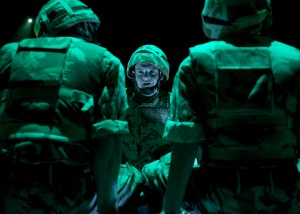 It’s the tableaux that talk, like the devastating silent scene where the soldiers read letters from home: Their powerfully expressive faces let us read them too. A vignette of some literally dark combat seems bathed in the eerie green of night-vision goggles, the guys discussing favorite foods right before a fire fight erupts. The explosion of an IED is depicted by three wounded soldiers slowly falling in slow motion from the rigging. Monitors depict the landscape which the soldiers must constantly watch for bad guys (they hardly expect to find good guys). The sound track is deafening, in contrast to almost domestic moments at Camp Dogwood or postwar drinking discussions where the soldiers discuss who would play them in the film they imagine will come out of the interviews. (Unbeknownst even to the author, they would, of course, become a play instead.)
It’s the tableaux that talk, like the devastating silent scene where the soldiers read letters from home: Their powerfully expressive faces let us read them too. A vignette of some literally dark combat seems bathed in the eerie green of night-vision goggles, the guys discussing favorite foods right before a fire fight erupts. The explosion of an IED is depicted by three wounded soldiers slowly falling in slow motion from the rigging. Monitors depict the landscape which the soldiers must constantly watch for bad guys (they hardly expect to find good guys). The sound track is deafening, in contrast to almost domestic moments at Camp Dogwood or postwar drinking discussions where the soldiers discuss who would play them in the film they imagine will come out of the interviews. (Unbeknownst even to the author, they would, of course, become a play instead.)
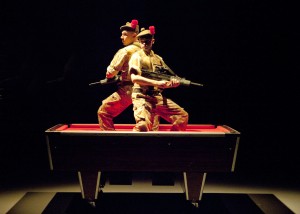 Occasionally a ballad breaks out–and then you feel all the buried emotions that war suppresses at the cost of later trauma. In one of the few funny scenes, a soldier shows how just holding a blank piece of paper can get you out of work by making it look as if you have secret orders. But we also glimpse, not just the misogyny of these soldiers but their xenophobia when the interviewer asks them if they got to know any of the people they had “liberated”: The surliest soldier says, “What the fuck do the Iraqis have to do with anything?” As another says, it’s all about protecting “porn and petrol.” Worst blow of all is the imminent dissolution of their 300-year-old regiment.
Occasionally a ballad breaks out–and then you feel all the buried emotions that war suppresses at the cost of later trauma. In one of the few funny scenes, a soldier shows how just holding a blank piece of paper can get you out of work by making it look as if you have secret orders. But we also glimpse, not just the misogyny of these soldiers but their xenophobia when the interviewer asks them if they got to know any of the people they had “liberated”: The surliest soldier says, “What the fuck do the Iraqis have to do with anything?” As another says, it’s all about protecting “porn and petrol.” Worst blow of all is the imminent dissolution of their 300-year-old regiment.
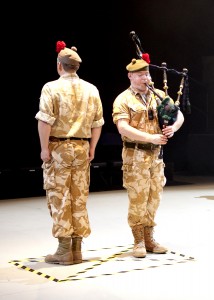 No question, Black Watch, like Black Hawk Down, is the stuff that hits our “hearts and minds” hard. These Scottish soldier actors are bold boys indeed as they strut about the stage in perfect formation or indulge in seemingly endless wrestling bouts to discharge the aggression that comes with the territory. Tartan testosterone fairly surges across the stage.
No question, Black Watch, like Black Hawk Down, is the stuff that hits our “hearts and minds” hard. These Scottish soldier actors are bold boys indeed as they strut about the stage in perfect formation or indulge in seemingly endless wrestling bouts to discharge the aggression that comes with the territory. Tartan testosterone fairly surges across the stage.
But this is heavy going for an audience too, seated close together in the armory auditorium. You could argue that the lack of comfort perversely fits the story–but the heavy and often impenetrable Scottish accents are a bigger barrier. They cry out for supertitles. When almost a third of the well-miked dialogue is nonetheless indecipherable, we can’t pretend that we know nearly as much as we see. But, as the script would say, the pictorial imagery is pretty [expletive deleted] persuasive.
photos by Manuel Harlan, Colin Mearns, Pavel Antonov, and Scott Suchman
Black Watch
presented by Chicago Shakespeare Theater at the Broadway Armory
scheduled to end on October 21, 2012
for tickets call 312-595-5600 or visit http://www.chicagoshakes.com
then continues on US Tour; for dates and info visit National Theatre of Scotland
for info on this and other Chicago Theater, visit http://www.TheatreinChicago.com
